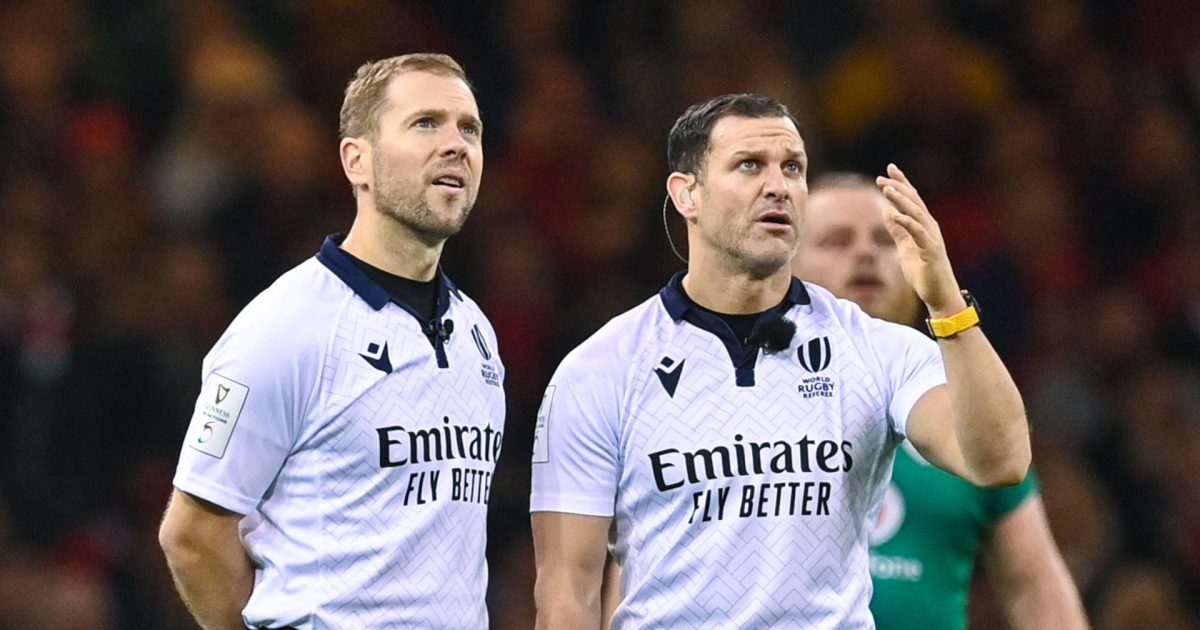Ref Watch: Andrew Porter a lucky boy?

English whistler Karl Dickson got this year’s Six Nations underway and he can be very pleased with his contribution to an entertaining contest.
All 15 of this year’s matches have different referees and with only 12 spots available at the World Cup in the autumn all those taking the whistle are only too aware that there are no second chances.
Dickson will also in the back of his mind know that his reputation didn’t emerge unscathed from the recent Joe Marler controversy, so a well-managed contest with no major talking points represented a successful and low-profile day at the office for the former Harlequins scrum half.
Management
When first fast-tracked into the English Premiership at the end of his playing career it was very obvious that Dickson was learning on the job in this vital area of refereeing.
To his credit he has since developed a firm-but-fair manner which is approachable without being overly conversational. Handling the confrontational Dan Biggar and Johnny Sexton presents any referee with a challenge, but on the opening day of the 2023 Six Nations neither posed any problems for the English official who communicated clearly and to an appropriate level throughout.

Perhaps the biggest complement to his improvement in this area was how accurate and easily understood he was. Short descriptive phrases such as “stay back” and “no.8 wrong side” are minimal in nature but also invite no further discussion.
The only point at which Dickson went into more descriptive mode – aside from discussions with his TMO and touch judges – was after penalising Andrew Porter for a late hit on try-scorer Liam Williams. While requiring Biggar to re-take a conversion which he craftily slotted over while no-one was looking, Dickson explained that play had been held up while he informed Ireland that the restart would be a penalty to Wales rather than a kick off. This was because Porter’s foul play happened after the try was scored rather than during the act of scoring – a correct decision in law which was immediately accepted by both sides.
I also liked how he issued a quietly understated warning to Wales skipper Ken Owens after his team conceded nine penalties in the opening 32 minutes. “You know what’s coming, Ken” was all it took for the hosts to adjust their approach and as a result infringe on only a further six occasions in the remainder of the match.
TMO Interaction
Dickson’s Premiership colleague Tom Foley was on duty in the TV van from where he did a good, unobtrusive job in the background.
I wasn’t 100 per cent convinced that the TMO got his first call right when Tomas Francis appeared to have knocked on in the tackle. However, what was very obvious during this review, when Foley later checked a possible Wales try and when he looked at Irish replacement Iain Henderson’s illegal second-half challenge on Williams, was that the officials were making every effort to halt the match’s natural flow as little as possible by limiting themselves to one or two replay angles and getting to a decision quickly.
Others will disagree, but for me rugby has shades of grey and stopping for lengthy periods to consider every angle in a marginal decision is not what the TMO is there for, so I applaud this approach.
Along similar lines, it was also interesting to hear Foley twice preface slo-mo replays with: “We’re looking for clear evidence of…” For those watching on TV who perhaps only see limited amounts of rugby each year this clarified his principle role as being to correct clear and obvious on-field errors. World Rugby’s TMO training manual at work perhaps?
Foley made an excellent interjection midway through the second half when he picked up an off-the-ball tackle on Taulupe Faletau which Dickson didn’t see. This contact prevented Wales’ no.8 supporting the ball-carrier at a breakdown close to Ireland’s line which therefore ended with the hosts being isolated in contact and penalised. After seeing a replay Dickson reversed the penalty award.
In summary, this was a cohesive performance between a TMO and referee who seemed to be on the same wavelength and understand where their responsibilities and limits of authority lay. It is clearly no coincidence that a pair of English officials worked together on this game while two Kiwis – Paul Williams and Brendon Pickerill – were paired for the Calcutta Cup clash. Both TMO’s are also active referees which is not usually the case at a World Cup where a small number of experienced former officials are handed the keys to the broadcaster’s van. One to ponder?
Clever Conor
A British & Irish Lions veteran who captained the side in South Africa as a stand-in for Alun Wyn Jones, Conor Murray twice showed his experience in dealing with the referee and manipulating law to his advantage.
I especially liked how he conveyed to Dickson that Ireland did not want to play with penalty advantage from the halfway line midway through the first half without needing to speak. Murray simply picked the ball up at the base, hoofed it down Liam Williams’ throat 40 metres upfield, stood and looked pointedly at the ref who duly brought play back for a penalty which Sexton then turned into three points.
Murray also thought incredibly quickly when he saw a stray blue scrum cap had landed on the ground near the ball at the base of an Irish ruck. In one movement he flicked it towards the Welsh side of the breakdown, where it slightly disrupted the running line of a waiting tackler, before box kicking from the base. Sort that one out ref!
Lucky Porter?
Ireland’s loose head prop was perhaps fortunate to avoid a yellow card when the officials seemed not to realise that he conceded three consecutive penalties – two of which were on the edge of meriting yellow in their own right – either side of half time.
After conceding a routine offside award, Porter was then pinged for making a tackle while on the ground and therefore according to law out of the game. While this was not especially noteworthy, the officials’ attention was probably drawn by crowd reaction to considering if it may also have been an out-of-control tip tackle.
Replays showed that the Welsh ball-carrier contributed to his acrobatic tumble by attempting to hurdle the prone Porter. On less fortunate day in this safety-conscious age Porter may have been deemed guilty of dangerous play and shown a card, and a case for a sin-binning can also be made for the Irish prop’s late challenge on try-scorer Williams.
A melee created by the incident took some sorting out, but while Dickson kept his concentration well enough to single Porter out for a warning then award a penalty from the restart, it would be interesting to know if he was aware a) that this was the prop’s third consecutive infringement and b) how he would then have handled this situation?
England v Scotland
2019 World Cup referee Paul Williams led the all-Kiwi team of officials that handled the 152nd Calcutta Cup which delivered a third consecutive Scottish win for the first time since 1972.
In the race for a France 2023 refereeing spot Williams came into the Six Nations under more pressure than his 14 rivals after being handed Autumn Series appointments devoid of big clashes between the Six Nations and Rugby Championship countries but not of visits to some lesser-known rugby venues!
Truly in the middle of chaos #SixNations2023 pic.twitter.com/rVWAmlE5Dz
— RugbyPass (@RugbyPass) February 4, 2023
He will therefore be extremely satisfied with his contribution to an absorbing match free of yellow cards, with a low penalty count (England 10-9 Scotland) and without controversy or TMO involvement.
Williams did the basics very well, rewarding the stronger set-piece, managing the breakdown effectively and keeping the midfield clear. His calm, understated manner worked very well in a game which always has plenty of passion – with or without a lone piper on the roof!
Max Malins’ Try
ITV commentator Nick Mullins queried whether there was “a hint of a knock-on off his midriff” during the grounding of the Saracens’ winger’s 24th minute try before quickly adding that TMO Pickerill had confirmed that the try could be awarded.
Of course a knock-on from the midriff is not possible – law states the involvement of a hand or arm is required – so perhaps the more pertinent question was whether any separation was visible between Malins’ torso and the ball from the instant that he first touched it and the point it was grounded? For me the officials were spot on.
Final Play
Plenty of England fans will have doubtless already played and replayed the match-clinching penalty won by flanker Jamie Ritchie frame by frame!
With the home side pressing hard deep in Scotland’s 22 a fourth try would not only have secured them a bonus point but would also have left Owen Farrell with a chance to then win the game from the tee.
The good news for Scotland fans (and Mr Williams) is that Ritchie supported his body weight throughout his attempted steal and also – as law now requires – made an attempt to lift the ball. Penalty Scotland and a famous win.




















































Asking the TMO for a compelling reason to overturn the on-field decision should be universal for all TMO involvements, and reinforced by the ref on every referral. TMO questions like "try or no try" should be phased out. Let's move to the idea of good and bad judgement, from the idea of right and wrong decisions. The TMO is there to help in cases where footage provides a compelling and rapid improvement to the refs assessment.
Interesting article, thanks. I thought Dixon did very well but the tackle-off-the-ball call (on Aki, I think) seemed pretty harsh.